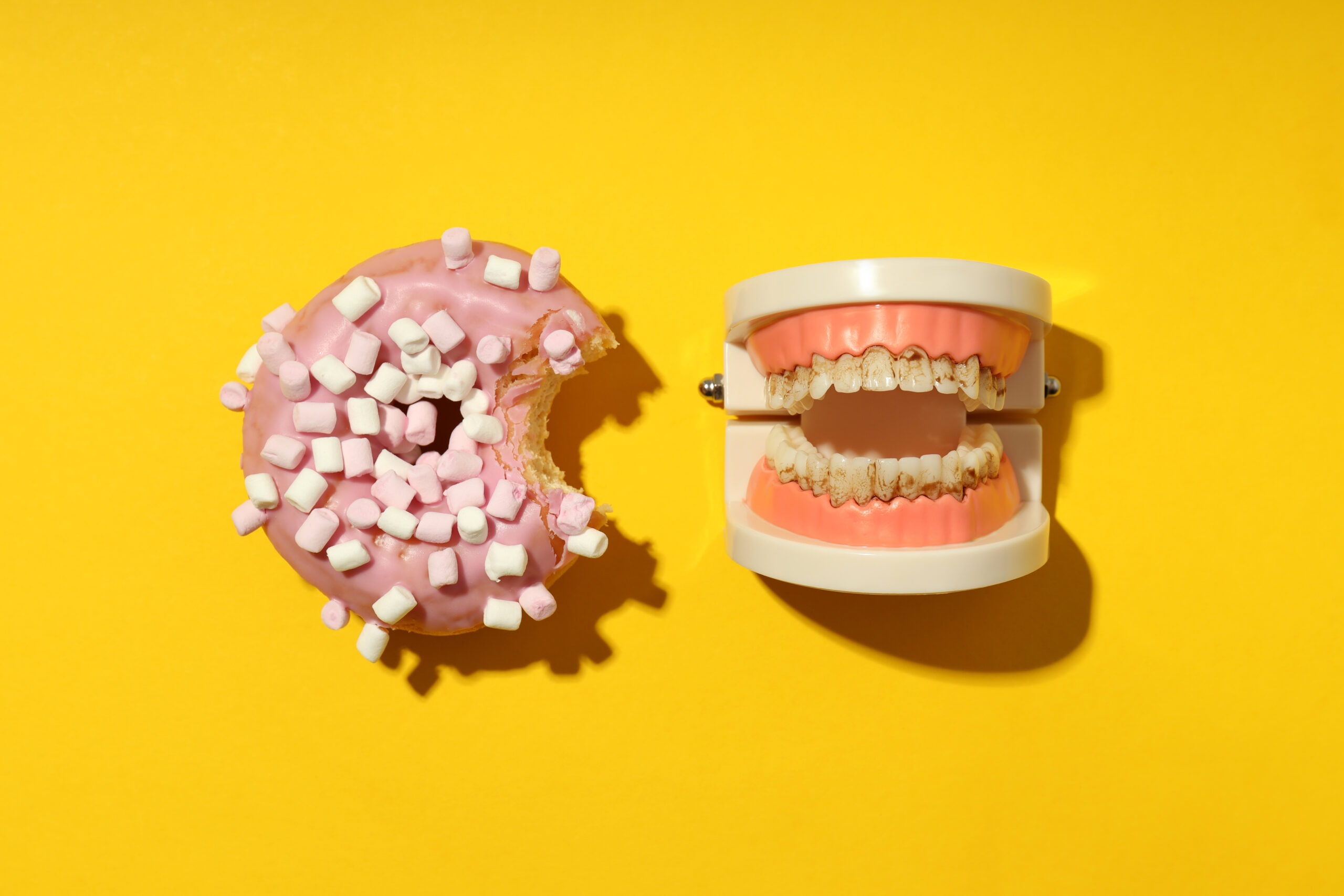Tooth decay is one of the most common chronic health issues worldwide, affecting individuals of…

Common Dental Issues: Understanding, Preventing, and Treating the Top Five
When it comes to oral health, there are a few common dental issues that almost everyone will experience at some point in their lives. Understanding these top five dental issues, including tooth decay/cavities, gingivitis, tooth sensitivity, dry mouth, and halitosis, is crucial for maintaining a healthy smile. In this blog post, we will delve into the causes, symptoms, prevention, and treatment options for each of these common problems. By prioritizing good at-home oral care and seeking professional dental help from the Center for Restorative, Cosmetic, and Implant Dentistry (CRCID) when needed, you can prevent and treat these issues effectively.
The Creeping Danger of Tooth Decay and Cavities
Tooth decay and cavities represent a significant threat to dental health, emerging as one of the most widespread challenges faced by individuals worldwide. This condition originates when the harmful bacteria residing in our mouths metabolize sugars from the food we consume, subsequently releasing acids that erode the tooth’s protective enamel layer. This process can lead to the formation of cavities, small holes that penetrate the surface of the teeth. Indications of this issue may include a heightened sensitivity to temperature changes and sweets, discomfort or outright pain, and the visible presence of pits or dark spots on the teeth.
Without timely intervention, tooth decay can advance, potentially resulting in more serious complications such as intense toothaches, infections within the tooth pulp, and even the loss of the tooth itself.
To fend off tooth decay, you should follow a regular oral hygiene routine, including brushing with fluoride toothpaste twice daily, regular flossing to remove plaque from between the teeth, and ensuring consistent dental check-ups at CRCID for professional cleanings and examinations. Additionally, moderating the intake of sugary foods and beverages can substantially reduce the risk of decay.
When cavities do occur, treatment options are varied and can range from dental fillings to restore the tooth, to more comprehensive procedures like crowns for more extensively damaged teeth. Addressing tooth decay promptly and effectively not only preserves the health and functionality of the teeth but also contributes to the overall well-being of the individual.
Gingivitis – The Silent Gum Assassin
Gingivitis quietly undermines the health of your gums, starting as a mild and often overlooked form of gum disease. Triggered primarily by the accumulation of plaque on teeth and gums, it sets the stage for inflammation and irritation. Symptoms of this condition include gums that are tender, red, and prone to bleeding during brushing or flossing. While these symptoms might seem like minor nuisances, there is a real potential to progress to periodontitis, a more severe and damaging form of gum disease, which can ultimately lead to tooth loss and compromise the jawbone.
The journey to prevent or halt the progression of gingivitis is rooted in your oral hygiene routine. Removing plaque through regular brushing and flossing forms the cornerstone of this strategy. Yet, even with meticulous home care, professional cleanings are indispensable to not only rid the mouth of hardened plaque or tartar that brushing and flossing can’t reach, but also provide an opportunity for the dental professionals at CRCID to detect early signs of gum disease that may go unnoticed at home.
For cases where gingivitis has escalated, your dentist may recommend treatments beyond regular cleanings, such as scaling and root planing. This deeper cleaning procedure helps eliminate plaque and tartar from below the gumline and smooths the roots to promote reattachment of the gums to the teeth. Implementing these strategies is keep to maintaining not only the health of your gums but also the overall integrity of your oral health.
Navigating the Pains of Tooth Sensitivity
Experiencing a sharp pain or discomfort when enjoying your favorite hot beverage or ice cream is often a telltale sign of tooth sensitivity. This condition affects many patients, making routine activities like eating, drinking, and even breathing cold air uncomfortable.
The root cause of this sensitivity usually lies in the exposure of dentin, the porous tissue beneath the tooth enamel that houses tiny channels leading directly to the nerve center of the tooth. Several factors can contribute to this exposure, including enamel wear from acidic diets or aggressive brushing, receding gums that leave the tooth root unprotected, cracked teeth that create pathways to the nerve, and tooth decay.
The approach to managing tooth sensitivity involves both at-home care and professional treatments aimed at minimizing discomfort and protecting the teeth from further damage. Using a desensitizing toothpaste can block the transmission of pain signals from the tooth surface to the nerve. Additionally, avoiding foods and drinks that are known to trigger sensitivity—such as those that are extremely hot, cold, or acidic—can prevent the condition from worsening.
For cases where at-home measures are insufficient, seeking professional advice from CRCID is crucial. Dental treatments like applying fluoride to strengthen enamel, bonding resin to cover exposed root surfaces, or even fitting a dental crown to protect the tooth may be recommended. Each of these treatments addresses the underlying cause of sensitivity, offering relief and restoring your ability to enjoy a wide range of foods and drinks without discomfort.
The Underestimated Impact of Dry Mouth
Dry mouth, medically known as xerostomia, often flies under the radar as a seemingly minor nuisance, but its implications for dental health are far-reaching. A decrease in saliva production can disrupt the mouth’s natural defense against decay and disease. Saliva not only helps in digesting food but also acts as a constant cleanser, neutralizing harmful acids produced by bacteria and removing food debris. Without adequate saliva, the risk of developing dental cavities escalates significantly.
Various factors contribute to dry mouth, including certain medications that reduce saliva production, medical conditions such as Sjögren’s syndrome, lifestyle choices, and the natural aging process. People experiencing dry mouth might notice symptoms like a persistent dry feeling, difficulty chewing and swallowing, and an altered sense of taste.
There are several things you can do to mitigate the effects of dry mouth. Increasing your water intake is crucial for promoting saliva production and maintaining hydration. Chewing sugar-free can also stimulate saliva flow for temporary relief. For those with chronic dry mouth, specially formulated oral moisturizers or saliva substitutes can offer longer-lasting solutions.
Ignoring dry mouth not only jeopardizes dental health by increasing the susceptibility to cavities and infections but also impacts general comfort and quality of life. Addressing it proactively through both lifestyle adjustments and seeking professional guidance is vital to preserving both oral and overall health.
Halitosis – More Than Just Bad Breath
Halitosis, commonly known as chronic bad breath, affects a wide demographic due to various underlying causes. Among these, inadequate oral hygiene is a significant contributor, where remnants of food particles and the accumulation of bacteria lead to unpleasant odors. Lifestyle choices such as tobacco use and dietary habits including garlic, onions, and coffee can also exacerbate this condition. Additionally, certain health conditions like dry mouth, previously discussed, significantly impact saliva production, reducing the mouth’s natural ability to cleanse and thus fostering an environment ripe for halitosis.
To tackle the challenge of halitosis, adopting a comprehensive oral hygiene regimen is crucial. This entails thoroughly brushing teeth and gums, flossing to remove trapped food particles between teeth, and consistently using antibacterial mouthwash to get rid of even more bacteria. Cleaning your tongue with a brush or scraper is another key practice, as it is a common site for bacteria accumulation.
If bad breath persists despite these measures, it’s imperative to consult with a dental professional from CRCID. We can offer specialized advice and treatments, potentially uncovering hidden issues like gum disease or infections that could be contributing to the problem. Engaging with these preventative and corrective strategies not only combats halitosis but also reinforces the foundation for optimal oral health.
Oral Health for Overall Health
Ensuring robust oral hygiene practices goes beyond the realm of dentistry, playing a pivotal role in safeguarding your overall health. The connection between oral wellness and other systemic conditions is well-documented, with research showing clear correlations to cardiovascular diseases, diabetes, and even respiratory issues. This underscores the critical importance of a comprehensive oral care regimen—embracing regular brushing, diligent flossing, balanced nutritional choices, and periodic dental check-ups.
These steps are fundamental not only in preventing the common dental problems discussed earlier but also in mitigating risks associated with more severe health complications. Embracing a proactive approach to oral care can significantly contribute to enhancing your life quality, highlighting the intrinsic link between maintaining a healthy mouth and fostering overall bodily health.
The team of oral care experts at the Center for Restorative, Cosmetic, and Implant Dentistry is here to treat any of these common dental issues, and much more, for patients in the Chesapeake, VA area. Contact us today to make an appointment for a consultation. Your dental health and comfort are our priorities.


